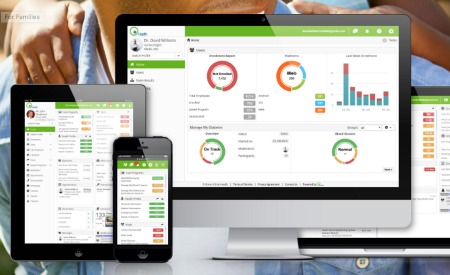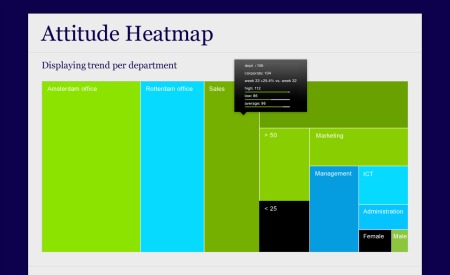
Green Circle Health doesn’t claim to be revolutionizing employers’ approach to health and wellness benefits. Rather, it’s increasing their impact by taking a pragmatic approach that’s based on three foundation blocks:
- Widening the focus of health and wellness programs from the employee to their entire family.
- Providing each family member with a set of app-based tools that connects to their their healthcare providers, insurance programs, and each others involved in health and wellness.
- Putting responsibility for the workforce’s health and wellness in the hands of managers instead of HR.
 The goal, says founder and CEO Dinesh Sheth, is to improve the overall health of everyone in an employer’s insurance pool, and thus lower its healthcare costs.
The goal, says founder and CEO Dinesh Sheth, is to improve the overall health of everyone in an employer’s insurance pool, and thus lower its healthcare costs.
GCH’s SaaS platform is HIPAA-compliant and designed to help families stay connected and healthy. Its open architecture uses standard API and bi-direction SSO, making it relatively easy to integrate and connect with third-party systems. The platform runs on Fast Healthcare Interoperability Resources (FHIR), which was created by the healthcare standards organization Health Level Seven International (HL7), and was recognized as “the Ultimate Connector” by the Office of the National Coordinator of the Department of Health and Human Services for connecting to the most number of healthcare systems using FHIR.
Culture is the Real Challenge
If GCH makes connecting simple, Sheth and his team still face what we regard as a notable challenge: Convincing an organization that managers should take on the responsibility of their team’s wellness, rather than leave it with HR. However, Sheth is convinced that health insurance and wellness benefits should be treated as a whole, as opposed to component parts. At the end of the day, he says, managers are the ones who control an organization’s actual culture. No matter how executives and HR define it, managers lead the culture as it actually plays out on the ground.
“We consider health and wellness a leadership-led challenge and opportunity,” Sheth says. “By engaging with organizational leadership and management at every level, we are helping them learn to manage their team’s productivity.” Healthy employees combined with healthy families use fewer sick days, are absent less and have fewer “presenteeism” issues. “By offering managers access to team results and comparative data in real-time, you are able to bring them into the wellness equation as a leader of their team, and help them encourage their employees to make lifestyle changes for the better,” Sheth argues.
GCH also looked hard at who primarily drives wellness at home. In most cases, it found, it’s the wife and/or mother. So, in designing its tools, the company spent a lot of time creating tools to help her juggle doctor’s appointments, dentist appointments, school schedules, wellness activities, not to mention her job and her spouse’s job. GCH allows individuals to share medical records with family healthcare providers, store x-rays and other test results, and deliver any forms necessary to the employer or insurance carrier.
Of course, security is a huge concern for any technology that touches personal information. Strict EEOC guidelines come into play and HIPPA rules must be followed even within families. Not surprisingly, Sheth says, GCH is “very sensitive” to security and compliance, and treats health information in much the same way financial firms treat 401(k) information. While employers can see the system’s aggregate usage data, they can’t access individual or family information. If a worker leaves the company, they can take their data with them and continue to use it in much the same way that would continue to work with a retirement-plan provider.
‘A Long-Term, Holistic Approach’
GCH opened for business in 2013 as communications link between healthcare providers and patients. Today, Sheth describes the company as a “life-long health and well-being platform” that connects users with “meaningful healthcare technology and trained/licensed clinical health coaches as they are needed.”
“Honestly though, this has been a great transition for our company,” he says. “We’ve always wanted to focus on helping people take a life-long, holistic approach to their health, and on top of that, families and employers are doing more to push this approach than are health systems and clinicians.” While the team didn’t expect employers to be so enthusiastic about a new type of wellness platform, “they’re clearly disillusioned with how traditional wellness programs work and we either meet or exceed their expectations.”
GCH’s charges companies “a few dollars per employee per month,” though larger employers pay lower fees that include unlimited live coaching and five user licenses per family. Those discounts can reduce the per-person price significantly, Sheth says.
Today, the company has more than 30 employees, about half of them in technology, 30 percent of them in clinical or health-services roles, and the rest in sales and administration. Among its customers are AutoZone and First Tennessee Bank. Self-funded, GCH is “on track to see continued growth,” according to Sheth. Although he declined to share specific numbers, he expects to break even sometime during 2018 and become profitable the year after that.
Based in Pensacola Beach, Fla., GCH recently opened a sales and operations Center in Memphis, Tenn.
Image: Green Circle Health















